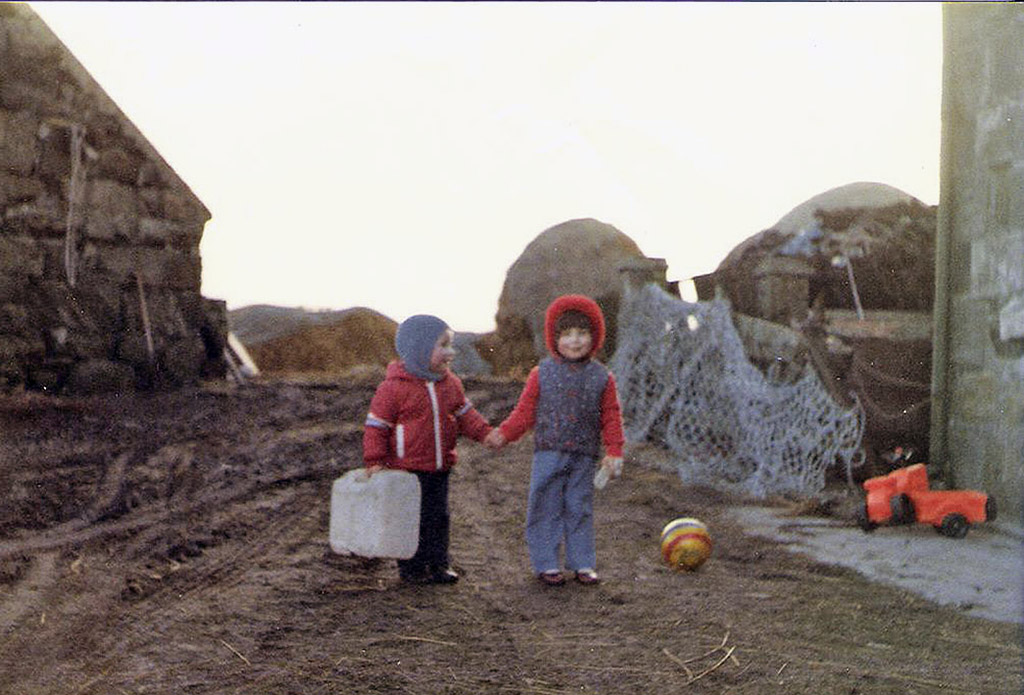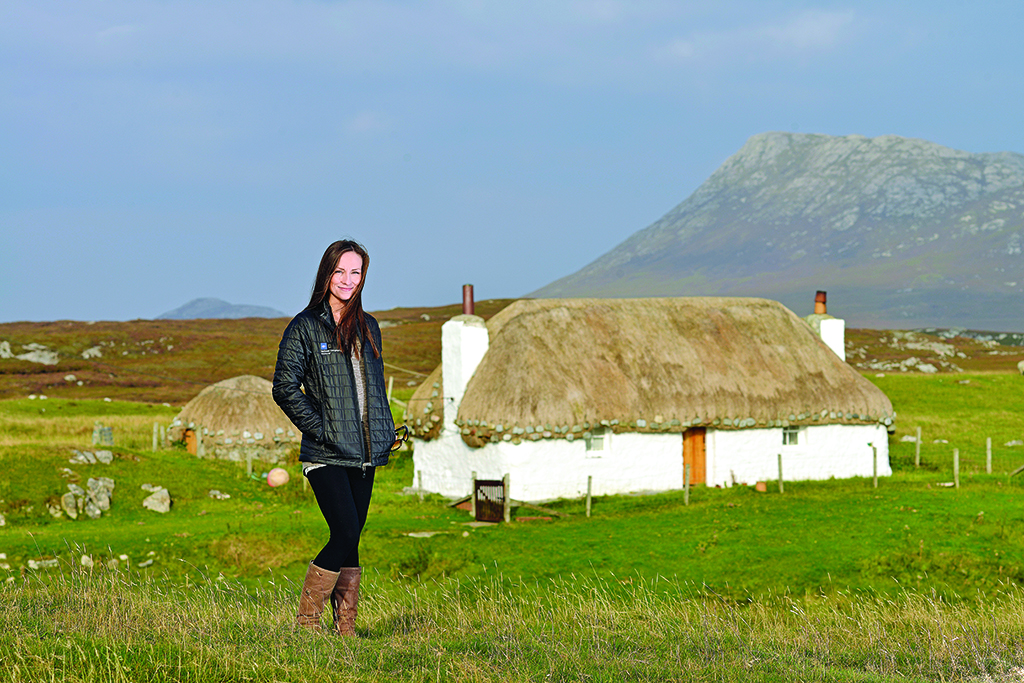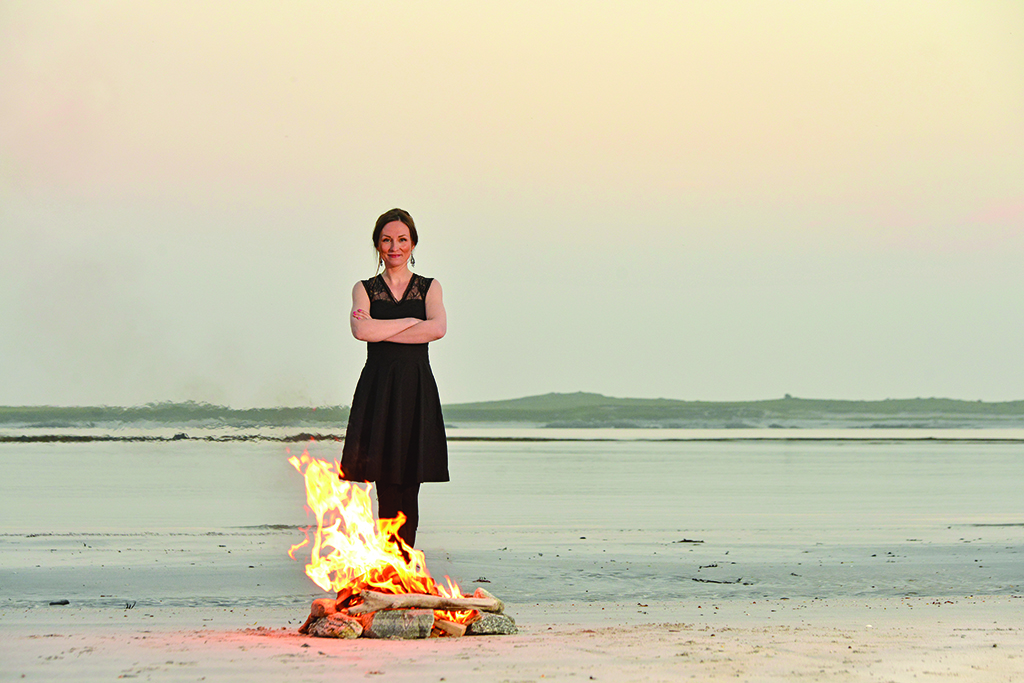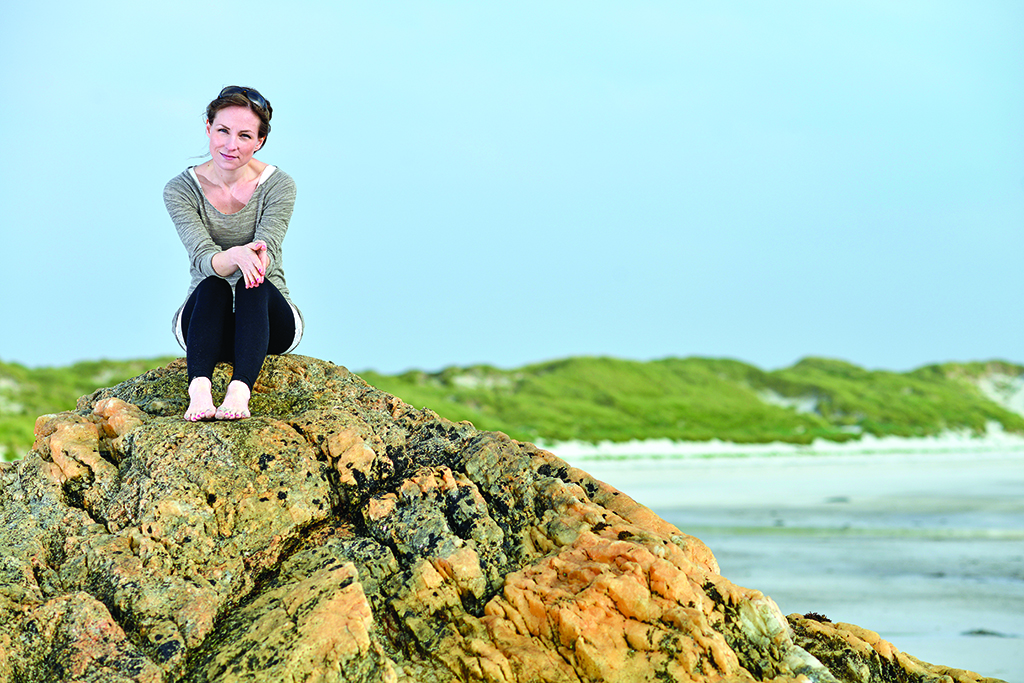
Julie Fowlis – the Hebridean queen of music
Growing up on North Uist shaped Julie Fowlis’s love for Gaelic music, which has seen her tour the world and provide the singing voice for Disney’s Brave.
My connection with Uist is through my mother Kate Ann, who is from North Uist. Our family has lived on the island for 300 years, so our roots go very deep.
My mother moved to the mainland to work in the hotel trade and met my father, Gordon, in his hometown of Pitlochry when she, along with some girls from Uist, were working in a hotel there.
After my parents married, they decided to move to Uist, where they ran Langass Lodge, an old shooting lodge that had been turned into a small hotel with five bedrooms. It belonged to the estate, but my parents ran it for several years.
So my formative years were spent growing up in the lodge. It was always quite a busy place and my strongest memories are just being surrounded by family, like cousins and grandparents, guests and the other visitors who came to stay. Although it was quite a few miles from anywhere, my sister and I never felt alone.
You don’t really question these things when you’re younger, but looking back we did have a lot of freedom. We’d be able to go play up in the hills. Now that I’m a mother of two girls, I realise that now, more than ever. I remember what my sister and I used to do and I think, ‘Oh my goodness, I’d never let them do that’. I guess it’s just maybe a different world we live in now – I’m not sure that it’s any more dangerous, but I guess there’s a sense of it not being quite as carefree perhaps. Or maybe it’s just because I’m a mother now.

Julie Fowlis and her sister outside her grandmother’s house (Photo: Julie Fowlis)
But, looking back, it was certainly a carefree childhood. Like any children growing up in a rural area, we made our own fun. We spent a lot of time outdoors, whether it was up the hills in the heather or climbing on the standing stones or playing down on the beach with our cousins. You make your own adventures outside, which is a great thing for the imagination. Now we live near Inverness, I’m glad that my two girls have that aspect of rural life as well because to me it’s essential to connect to the landscape that surrounds you.
Growing up on Uist was one of the biggest influences on what I do now with my music. I try not to look back on my time on the island with rose-tinted spectacles because we had as much modern and mainstream music as we did traditional and Gaelic music. We weren’t in a bubble of traditional culture – we were absolutely exposed to modern music and the music of my parents’ generation. So I feel that we had a very healthy musical upbringing.
One of the most important things, to my mind, was that traditional and Gaelic music was given equal standing in terms of acceptance and usage. It was just as important as any other genre. It never felt like a minority language or culture. It wasn’t until we left the islands when I was 13 that I realised not everyone had that. That was a strange feeling. So, in that sense, growing up on Uist completely shaped my relationship with traditional culture and the respect I have for it and how close I feel to it.
Learning Gaelic songs was par for the course at school and I learned to play the pipes too, partly because that’s what other folks at school were doing. We were part of a tiny school – there were only 12 pupils in the whole school at one point – so we were all in one classroom. Some of us did dancing and piping, and we all did singing. I just took it for granted. We were so, so fortunate to have it.
My teachers at school would have been among my earliest influences on Gaelic music. They gave us the chance to develop our skills in singing and music. They are also great tradition bearers in their own right. Our teacher, Isa McKillop, remains a friend and mentor, and I always go to her for help and advice. Catriona Garbutt also inspired and helped me over the years, while her late brother Calum Campbell taught me to play my first notes on the chanter before I was given lessons by Donald ‘Bàn’ MacDonald. I feel very lucky that they shaped my formative years, and singers like Isa still play a big role in my development as a singer and in my learning of songs from North Uist.

Julie Fowlis believes her strong connection with the culture of North Uist is partly down to the fact that she left as a child (Photo: Angus Blackburn)
Traditional music also had an influence on the early mainstream and modern music that I was listening to, such as Capercaillie and Runrig – Calum and Rory Macdonald from Runrig both grew up down the road from us on North Uist. They were these huge stars. It was a powerful message for me as a young person to see these great musicians and singers taking traditional music and placing it on a contemporary stage. As an islander, they gave me a little bit of confidence and encouragement by making a statement about their culture and being proud of it.
Apart from music, my main interest at school was sport. I loved running, especially cross-country and long-distance running. At one point I even considered studying sports science so I could become a PE teacher. Being a musician and being sporty don’t necessarily go hand-in-hand in some people’s minds (I don’t think!), but there is nothing I love more than getting out on the bike, running or hill-walking.
I moved away to the mainland with my parents at 13. My dad had been working on the mainland and coming home to North Uist every other weekend. But we missed him so much that it made sense for us all to move to be with him. We moved to Strathpeffer, north of Inverness in the Highlands. I guess the biggest contrast was just the sheer number of people.
That’s the first thing that shocked me. Our school had 1,400 or 1,500 pupils at that time and I’d never seen that many people together in one place before. It was like having the whole population of North Uist together in the same place at the same time. I remember being quite overwhelmed in those first few weeks. I’d been to the mainland a lot, but it was just the idea of going to school with so many people and all the hustle and bustle.

Growing up on North Uist shaped Julie Fowlis’s love for Gaelic music (Photo: Angus Blackburn)
It was quite a steep learning curve, but it was a great thing. I often wonder whether I would be so connected to the songs and culture of North Uist if I hadn’t moved away. I think the act of leaving made me more interested in what I had left behind, so I don’t regret leaving in any way. As a family, it was the best thing for us and I got so many opportunities on the mainland that I really cherish.
It took me a while to fit in and find my place, but I think the thread of music helped with that because I carried on with my singing and with my piping. Music helped with the transition of moving from one place to another. That’s one of the most powerful things about music – it shapes who you meet and who you spend time with. It’s a wonderful thing.
This thread of traditional music continued through my university years, when I studied classical music, playing oboe and Cor Anglais, and then through further study at Sabhal Mòr Ostaig on the Isle of Skye. The love of traditional music and song persisted. Although I had no idea at the time, this music would take me around the world. It would lead to incredible performance opportunities, such as singing live to a TV audience of a billion at the 2014 Commonwealth Games and performing at the Mozart Concert Hall in Vienna. The music even took us to Hollywood.

Julie Fowlis on a visit back to North Uist (Photo: Angus Blackburn)
It’s always a joy to go back to North Uist now and play to an audience where the majority of people are actually following the lyrics of the songs and perhaps know the characters who are mentioned in them or the bards who wrote the poetry. There’s a real sense of the songs being rooted in a place and I think that really comes through when you have the opportunity to perform them in the place where they belong.
These aren’t songs that were written for money – they were written to rock a baby to sleep or to keep a piece of local history alive – and I think that speaks to audiences around the world, even if they don’t understand the words. When I’m away from Uist I miss the big sky. We don’t have the same sky in the Highlands.
Uist is so flat there’s this huge sky. So I miss that, the smell of peat and the sound of the sea. Despite that, I feel that my home is in the Highlands now. However, I’m usually not ever too far from the Hebrides, and I am lucky to have the best of both worlds.
(This feature was originally published in 2015)
TAGS

